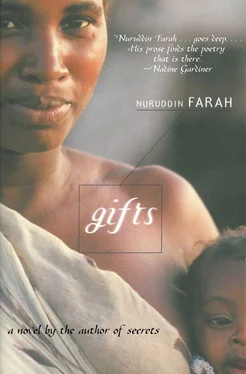Nuruddin Farah - Gifts
Здесь есть возможность читать онлайн «Nuruddin Farah - Gifts» весь текст электронной книги совершенно бесплатно (целиком полную версию без сокращений). В некоторых случаях можно слушать аудио, скачать через торрент в формате fb2 и присутствует краткое содержание. Год выпуска: 2011, Издательство: Arcade Publishing, Жанр: Современная проза, на английском языке. Описание произведения, (предисловие) а так же отзывы посетителей доступны на портале библиотеки ЛибКат.
- Название:Gifts
- Автор:
- Издательство:Arcade Publishing
- Жанр:
- Год:2011
- ISBN:нет данных
- Рейтинг книги:3 / 5. Голосов: 1
-
Избранное:Добавить в избранное
- Отзывы:
-
Ваша оценка:
- 60
- 1
- 2
- 3
- 4
- 5
Gifts: краткое содержание, описание и аннотация
Предлагаем к чтению аннотацию, описание, краткое содержание или предисловие (зависит от того, что написал сам автор книги «Gifts»). Если вы не нашли необходимую информацию о книге — напишите в комментариях, мы постараемся отыскать её.
Gifts — читать онлайн бесплатно полную книгу (весь текст) целиком
Ниже представлен текст книги, разбитый по страницам. Система сохранения места последней прочитанной страницы, позволяет с удобством читать онлайн бесплатно книгу «Gifts», без необходимости каждый раз заново искать на чём Вы остановились. Поставьте закладку, и сможете в любой момент перейти на страницу, на которой закончили чтение.
Интервал:
Закладка:
There was silence, and Duniya thought everyone was watching her.
“This is a success story,” Marilyn was saying.
And Duniya was thinking, I am the story, I am success.
Duniya hated failure. She didn’t want to cause Marilyn or Nasiiba any embarrassment. Finally, her body found its balance, and her feet made the right noises, her arms splashing in and out of the water. Under Marilyn’s supervision she swam back and forth, becoming more and more confident, and urged on by the success story her body was telling.
Then Marilyn sensed a tremor of worry in Duniya’s body. It was like a traveller coming upon a sudden bend in a road, a turning not signposted. Marilyn placed her outspread palm further up, closer to Duniya’s chest. A little later, Duniya’s body regained its lost balance. She told herself that to the one who had reached the summit of Everest, no mountain was high enough. She thought of herself as the axis around which the whole universe rotated, which was why she couldn’t afford to go down, sink or abandon ship. She was glad Marilyn had corrected the small error in good time, and with tact. Then they swam together back and forth, staying out of the way of the other swimmers. Suddenly Marilyn’s guiding hand vanished like a magician’s handkerchief and Duniya splashed with total abandon. Standing on the tip of her toes, she said, once she caught her breath, “That was something, wasn’t it, Marilyn?”
Marilyn made the immodest claim that she had taught Nasiiba and Fariida to swim.
Duniya did not speak her thoughts.
“Where are they?” Marilyn wondered. Then she pointed, “There.”
Following where Marilyn’s finger pointed, Duniya saw Fariida and Nasiiba lying side by side on the far edge of the pool. Seeing Fariida made Duniya eager to know what the young thing had been through. But would Fariida talk, would she tell her everything? “Can you find your way to them?” asked Marilyn. “Because I’d like to swim a little.” And without further ado, she swam away.
Duniya was wary of stepping out, seized by paranoid speculation that everyone would be staring at her as she walked towards Nasiiba and Fariida. She had just looked in the girls’ direction, wanting to gauge the distance separating them, when she noticed that Nasiiba was smoking a cigarette. This shocked Duniya. But why?
This self-questioning had a positive effect on her own behaviour, suddenly making her feel indifferent, impervious to everything. She no longer cared who saw her over-exposed body. She stepped out of the pool and walked purposefully towards Nasiiba, whose cigarette became the beacon on which to concentrate. No sense of chill ran through any part of her as she walked up the stone steps and out of the pool; and she didn’t swallow back nausea, as she had feared. Duniya reminded herself that theirs was a household where there was a semblance of individual freedom and problem-sharing, where there was no male authority: weren’t freedoms like these to be taken? Mataan had his Waris, Nasiiba her smoking.
When she joined them, Nasiiba said, “Sit or lie down, as you like.” Fariida grinned at Duniya welcomingly.
Shocks come and go, like layers of skin peeling. Duniya could now look at Nasiiba smoking, without the accompanying feeling of violated emotion, pretending not to be bothered by it.
From her vantage point, towering above the two prostrate figures, she decided that Fariida’s choice of colours shared a faint resemblance with salad rinsed in fresh water. She lay down beside them on a towel, facing them both. Duniya said, “What should I say to you, Fariida? Welcome back? I’m glad you’re alive? Or why didn’t you let me know right from the beginning?”
Fariida’s prominent jaws moved, opening wider as she offered Duniya her profile. She looked at Nasiiba, as if for guidance, then said, “We would be telling a different story if I had spoken to you that morning, wouldn’t we?”
“We would indeed,” Duniya agreed.
Nasiiba got up. “I’ll let the two of you talk,” she said, and without waiting for their reaction, moved away, at a fast trot, until she reached the springboard, from which she dived into the pool.
“Where were you all this time?” Duniya asked Fariida.
“I had a small room in the Buur Karoole district,” Fariida said, “less than two kilometres from your place. Nasiiba would cut classes to come and see me. For a long time no one knew where I was, no one, that is, except Nasiiba. It was a healthy pregnancy, physically, and being an athlete helped a great deal. I had no need to consult a doctor. To have blood, urine and similar tests or my temperature taken I contacted a friend via Nasiiba. That morning, however, I was feeling a bit down and had confused the dates and Nasiiba had not come to me.”
“What did you do the morning I caught a glimpse of you?”
“You called and called and caused me worry. So I went off in a waiting taxi, back to where I was staying.”
“I see,” said Duniya.
“But since my blood is the same rare group as Nasiiba’s, you might say I owe my life to her. When I left you at the clinic, I took the taxi straight to a clinic I had been using, and the doctor said to admit me. Delivering a baby in such circumstances is an atrocious shame, but Nasiiba was an angel, donating blood, seeing to it that I was well taken care of. It was she who suggested I ‘abandon’ my baby to her. So what does one say to you, I ask myself? ‘Thank you very much’ to your ‘Welcome back’? Or ‘The experience has been worth it’ to your ‘I’m glad you’re alive’? Or ‘How could I let you know when I didn’t know myself?’ to your ‘Why didn’t you let me know right from the beginning?’ “
“You say you had a taxi waiting for you on a day the city of Mogadiscio had none plying its streets. How come?”
“Please don’t rush the story.”
“I’m sorry” Duniya said.
In Fariida’s look there was pride at having undergone an ordeal and survived it. “I’m the kind of woman whose stomach doesn’t blow up much until about the eighth month,” she said, “but I didn’t want to risk it, I didn’t want Miski to know until I’d had the baby, and maybe not even then. We already had a strained relationship, you see, Miski and I, following the break-up of her engagement to her fiance, for which she wrongly blamed me. That’s why I didn’t let anyone know except Nasiiba, by which time it was too late for me to rid myself of it. Irregular periods play tricks on young women who can’t remember whether or not they have taken their pills. My irregular periods were my principal problem.”
“So what exactly did you do?”
“One morning I packed and went, leaving a note on the desk for Miski to find when she got back from Rome. The brief note just said that I had gone away, but that there was no cause for worry, no one need panic. I’d written similar notes for her before when I left the country, once to Nairobi, another time to Dar es Salaam — on both occasions with Qaasim, who financed our trips. When I became pregnant, I didn’t want him to know. We’d enjoyed our illicit affair, every wondrous moment of it, so what was the point regretting? He might have proposed if he’d known I was carrying his child. But I’d said no when he showed interest in marrying me before there was any evidence that I was with child: no, no, no.”
“What made you decide not to marry Qaasim in the first place?”
“Age difference is a major reason, I suppose. Imagine when he’s turning seventy, I’ll be your age, still young, ready to contract another marriage, fall in love, learn to drive a car, or to swim. No way, I said.”
“Where did it all start?”
“At your place.”
“When?” If Duniya was supposed to feel guilty, she did not. Smiling reminiscently Fariida said, “I came to deliver a parcel to you from your brother in Rome. Nasiiba wasn’t there that day, only you were. Qaasim arrived, we had tea, the three of us. Then he left, only to park within sight of Aw-Cumar’s shop, waiting. I knew he was waiting as only women can know such things, and so I, too, left, rather hastily, refusing to stay until Nasiiba returned home. I was eager for adventure. I’d lost my virginity to a boy my age, and was anxious to experiment with older men just for fun. Qaasim took me home. Miski was away and we were alone the best part of that night. That was how it started.”
Читать дальшеИнтервал:
Закладка:
Похожие книги на «Gifts»
Представляем Вашему вниманию похожие книги на «Gifts» списком для выбора. Мы отобрали схожую по названию и смыслу литературу в надежде предоставить читателям больше вариантов отыскать новые, интересные, ещё непрочитанные произведения.
Обсуждение, отзывы о книге «Gifts» и просто собственные мнения читателей. Оставьте ваши комментарии, напишите, что Вы думаете о произведении, его смысле или главных героях. Укажите что конкретно понравилось, а что нет, и почему Вы так считаете.











